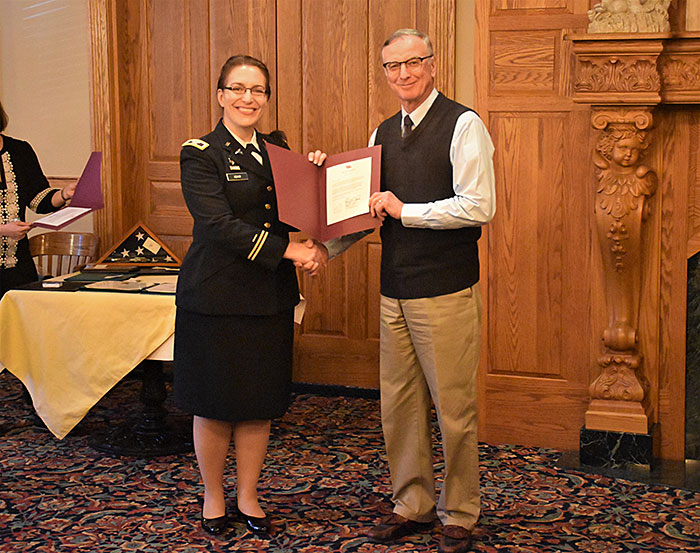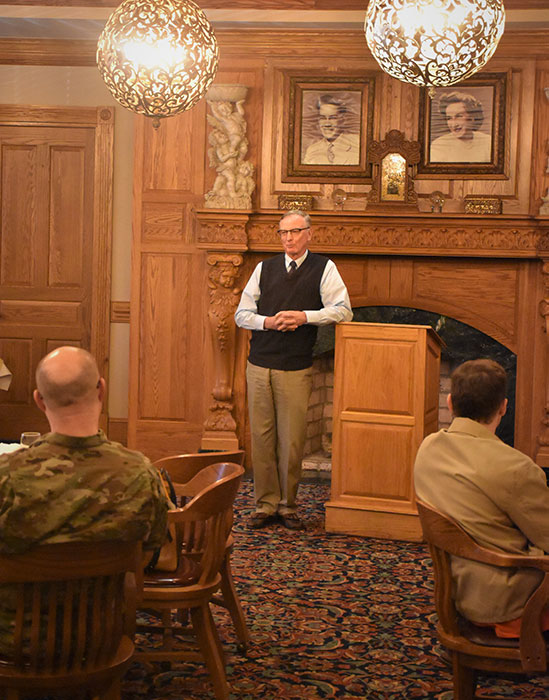Dr. Lawrence Lightner Retires After 43 Years of Service in Support of USAMRDC and USAMMDA

Dr. Lawrence Lightner began his storied career more than 40 years ago as a Captain in the U.S. Army, and in March he will retire as a federal civilian from the U.S. Army Medical Materiel Development Activity, Fort Detrick, Maryland. Lightner currently serves as project manager of USAMMDA's Warfighter Protection and Acute Care Project Management Office, leading a team of more than 30 civilian, military and contractor personnel in support of the WPAC PMO's mission to develop, deliver and field U.S. Food and Drug Administration-approved preventions, diagnostics, and treatments for infectious diseases and combat wound infections; blood products and blood components; and drugs for battlefield pain management to protect and sustain Warfighters worldwide.
Yes, his is truly a storied career, with many interesting avenues along the way. During our conversation, Lightner explained how he initially arrived at USAMMDA.
"I began working for the U.S. Army Medical Research and Development Command, assigned to the Walter Reed Army Institute of Research in 1979 as a Captain, Medical Service Corps, right out of the Army Medical Department's Officer Basic Leadership Course," said Lightner. "On my fifth assignment I was sent to a new USAMRDC unit – the U.S. Army Medical Materiel Development Activity, better known as USAMMDA – which was provisionally established in August of 1984 and then formally stood up in March 1985. I served as a product manager in the (then) Biological Systems Project Management Office from 1984 to 1988."
In September of 1991, still in the military, Lightner returned to USAMMDA as the deputy project manager for the Biological Systems PMO, and held that position until February 1995. He then went on to other assignments, leading up to his military retirement as a Colonel in 2002 after 23 years of service. Finally, after serving one year as the Civilian Deputy Director of the USAMRDC's Military Infectious Diseases Research Program, Lightner joined USAMMDA for a third time, as project manager for Pharmaceutical Systems (formerly Biological Systems and now the WPAC PMO) – where he has remained for nearly two decades.
In total, Lightner has accumulated more than 43 years of combined service (23 military and 20 civilian) in support of the USAMRDC. An amazing feat, to say the least. However, to better understand the man who would dedicate well more than half of his life serving our nation and its Warfighters, we must travel back to see how this all came about.

"I was born, raised, and attended school through my junior year of high school in Joliet, Illinois, about 30 miles south of Chicago," he began. "A few days before the start of my senior year, my family moved to Iselin, New Jersey. After graduating from high school there, I returned to the Midwest to attend Iowa State University in Ames, where I spent the next 10 years working on three degrees, culminating in a Ph.D. in Zoology (Parasitology). Between completing my doctorate and entering the Army, I spent two years in Cali, Colombia, South America, working on a Postdoctoral Research Associateship for Tulane University."
Although one may assume his career path was intact since childhood, Lightner is quick to squelch this notion, as he provides a somewhat lighthearted explanation of his early journey.
"What did I want to be when I was young? At what point? It changed so much over the years!" he jokes. "When I began college, I had aspirations of attending Veterinary school, but soon realized I was too much of a lackluster student for that to happen. So, I shifted my emphasis to biology and thoughts of joining a college faculty somewhere, teaching and conducting research. That all ended when, in my job search after completing my Post-Doc, on a whim I contacted the Army. I was recruited with an offer too good to refuse, and the rest, as they say, is history."
History, indeed.
"I think I started down the path I eventually followed, influenced by the books I read on scientific discoveries," said Lightner. "This was heavily reinforced when I entered graduate school and shared an office with a large group of highly motivated graduate students and a Major Professor who was well-known and at the top of his field."
"When I joined the Army," he continued, "I was fortunate to be assigned to work for Major Larry Hendricks, a former Marine Corps officer who really gave me an education in both what it was to be an Army Officer and the history of the Command. My other significant mentor was Colonel "Pete" Pedersen. Pete was a Virginia Military Institute graduate and a longtime staff member of the USAMRDC. He was an original member of the Task Force that created USAMMDA, and he really guided most of my career moves early on."
Lightner acknowledges the Army provided him with quite a career, but throughout his military years, he provided our nation and its citizens with unparalleled service – as evidenced through the numerous awards and citations he has received. His military awards include the Legion of Merit Medal, Meritorious Service Medal (with 4 Oak Leaf Clusters), Army Commendation Medal, Army Achievement Medal, Armed Forces Reserve Medal, National Defense Medal, Army Service Ribbon, Army Overseas Ribbon (2 Overseas Tours), and the Army Superior Unit Award (with Oak Leaf Cluster). Further, he received the Army Surgeon General's "A" Proficiency Designator in Microbiology and was inducted into the Order of Military Medical Merit.
As project manager for USAMMDA's WPAC PMO, Lightner has led his team to success on many occasions as well, often reaching critical development milestones and garnering FDA approval for a number of life-saving treatment products. These include Artesunate for Injection, a drug solution used in the initial treatment of severe malaria in adult and pediatric patients; the antimalarial drug Tafenoquine, hailed as the first FDA-approved prophylactic drug for malaria in nearly two decades; and a rapid diagnostic test for coronavirus, BioFire's COVID-19 Test 2, which recently received FDA 510 (k) clearance for its ability to detect the presence of SARS-CoV-2, the virus that causes COVID-19, in approximately 45 minutes.
Dawn Rosarius, Senior Executive Service and Principal Assistant for Acquisition, USAMRDC, has known Lightner for much of his career and highly values his contributions to the command, the military, and our nation.
"Dr. Lightner has been a strong project manager and leader for our command," she said. "He has led the way in moving products forward to FDA approval and fielding, or termination – both are great successes, and Dr. Lightner and his team should be very proud."
"He leaves behind a strong legacy through the development of many leaders – both military and civilian – during his tenure," she added. "He also has helped to develop many senior leaders, including myself, providing us with significant feedback for our understanding and growth, for which I am truly grateful. I will miss Larry, and I am proud that he has decided to move on to the next chapter in his life, and hand over the reins to the next leader."
Looking back over his career, Lightner admits that as he has been blessed with so many great experiences, he finds it difficult to narrow these down to one that is most interesting. However, for the sake of our conversation, he tries.
"I would say that, possibly, my career highlight as a military officer may be commanding the WRAIR unit in Kenya," said Lightner. "My daughters were all at impressionable ages, and living in a foreign country, going to an International School, and having the opportunity to go on 'safari' almost every weekend was something they still talk about. And for me, being part of a U.S. Embassy community, interacting with State Department and other military personnel, was really stimulating."
As he thinks of his daughters during that time period, the conversation progresses to thoughts of his wife and family – of whom Lightner is extremely proud. So much so, his face seems to light up.
"My wife and I have been married for 38 years," he said. "Susan is a former Army Nurse Corps Captain – she was trained as an ICU nurse but now works as a nursing supervisor for a home healthcare company. We have four wonderful children – three daughters and one son – and six grandchildren with one more on the way. All of our daughters have Master's degrees in Education and are teachers in Maryland, and our son just completed his Master of Public Administration degree and currently has an internship in a state senator's office."
When asked about his plans for his retirement years, Lightner goes back to his family once again.
"For better or worse I have begun to explore my family's ancestry," he said. "It's addicting and time consuming, so I expect that will occupy a lot of my free time. I have also tried to improve the landscape of my yard, but I'm afraid I don't have much of a green thumb, so that also will take up much of my attention."
After all of the years – and all of the adventures – Lightner says there are far too many people to thank and acknowledge, although he sincerely appreciates each and every person he has met. After more than four decades, he can agree the time spent in getting to know your colleagues is always worth the sadness when it comes time to say farewell.
"I have been fortunate to have had many mentors as leaders that have influenced my career – both with their professional advice and by their actions," said Lightner. "I came into the Army at a point where many of those individuals had already been in the Command for a long time, so I got a heavy dose of its rich history and the 'characters' that built it, which is something that I don't see much of in today's environment."
"Conversely," he continued, "I have always believed that you are only as successful as the people who work for you. In that respect, the group of individuals working now in the WPAC PMO are at the top of the list."
The USAMMDA team certainly says the same of you, Sir. Absolutely, the top of the list.













